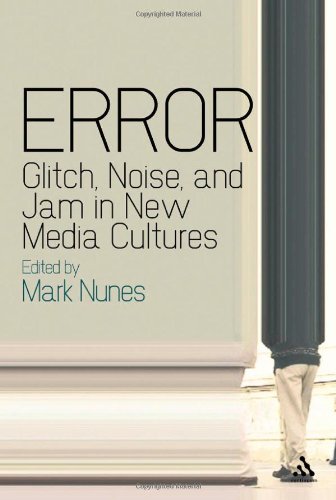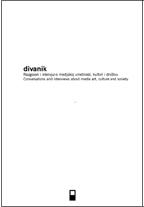Mark Nunes (ed.): Error: Glitch, Noise, and Jam in New Media Cultures (2010)
Filed under book | Tags: · botnet, error, facebook, glitch, hacktivism, machinima, media culture, new media, noise, tactical media, wikipedia, youtube

Divided into three sections, Error brings together established critics and emerging voices to offer a significant contribution to the field of new media studies. In the first section, “Hack,” contributors explore the ways in which errors, glitches, and failure provide opportunities for critical and aesthetic intervention within new media practices. In the second section, “Game,” they examine how errors allow for intentional and accidental co-opting of rules and protocols toward unintended ends. The final section, “Jam,” considers the role of error as both an inherent “counterstrategy” and a mode of tactical resistance within a network society. By offering a timely and novel exploration into the ways in which error and noise “slip through” in systems dominated by principles of efficiency and control, this collection provides a unique take on the ways in which information theory and new media technologies inform cultural practice.
Publisher Continuum International Publishing Group, 2010
ISBN 144112120X, 9781441121202
288 pages
Download (link removed by request from publisher)
kuda.org (eds.): divanik: Conversations and Interviews about Media Art, Culture and Society (2004) [English/Serbian]
Filed under book | Tags: · capitalism, internet, interview, media art, media culture, media theory, tactical media, technology

“divanik is a collection of interviews conducted in the period from 2001 to 2004 which represents intersection of research in the field of new technologies, culture and society. Interviews present network of people and organizations that make one part of the contemporary media art and theory scene. New media center_kuda.org monitored those phenomena that have interdisciplinary and intermedial character, and by inviting the significant protagonists in media art and theory the intention was to give to the local public an insight at the happenings in this field.
Research of the media is the research of the history of communication, and communication today is a bio-product of the information age, exchange of valuables in the capitalist coordinate system in which the concepts and ideas are treated as meaningful goods and products. On the other hand communication is also a tool that changes the same coordinate system.
As a communication practice the phenomenon of the interview is immanent to Internet culture. Interview represents concise form of communication and it is a useful instrument in the scientific work as meta-text that follows complex theory or artwork. In the interviews authors present contexts in which they were creating and their points of view and this direct communication through the actual questions presents real-time articulated energetic potential. That is also a chance to analyze and restructure certain topics in the form that couldn’t occur in theoretic and artistic work. Interview is a sublimation of different aspects, overlapping and interdisciplinarity that at a given moment presents unique thinking system.
The development of information and communication technologies also brought along new social ontology that is manifested in the social, political and culture field. Instantaneity of history, accumulation and pace of technological development stipulates momentary reaction and critical analysis.
The goal of these interviews is to critically analyze and present to the wider audience certain art and socio-political phenomena. Within the kuda.read edition the accent is put on pointing out to the expanded referential system inside the new media and culture that spreads from the marginal social practice to academic theory and scientific research.”
Includes interviews with Geert Lovink, Raqs Media Collective, Saskia Sassen, Marcus Neustetter, Bureau d’Etudes, Marina Grzinic, Cindy Cohn, and Steve Kurtz.
Serbian title: divanik: Razgovori o medijskoj umetnosti, kulturi i društvu
Publisher Daniel print, Novi Sad
kuda.read series, 003
Creative Commons Attribution-NonCommercial-ShareAlike 1.0 License
ISBN 8690621105
123 pages
PDF, PDF (updated on 2018-6-17)
Comment (0)Marc Stumpel: The Politics of Social Media. Facebook: Control and Resistance (2010)
Filed under thesis | Tags: · facebook, floss, open source, protocol, resistance, software, tactical media, web, web 2.0
This thesis examines the governance of contemporary social media and the potential of resistance. In particular, it sheds light on several cases in which Facebook has met with resistance in its attempt to exercise control. This social networking site has raised concerns over privacy, the constraints of its software, and the exploitation of user-generated content.
By critically analyzing the confrontations over these issues, this thesis aims to provide a framework for thinking about an emerging political field. This thesis argues that discursive processes and (counter)protocological implementations should be regarded as essential political factors in governing the user activities and conditions on large social networking sites.
A discourse analysis unveils how Facebook enacts a recurrent pattern of discursive framing and agenda-setting to support the immediate changes it makes to the platform. It shows how contestation leads to the reconfiguration and retraction of certain software implementations. Furthermore, a software study analyzes how the users are affected by Facebook’s reconfiguration of protocological assemblages. Several tactical media projects are examined in order to demonstrate the mutability of platform’s software.
Keywords: Facebook, Network-making power, Counterpower, Framing, Protocol, Tactical Media, Exploitation, Open-source, Agonistic Pluralism, Neodemocracy
Master thesis
Media Studies (New Media), University of Amsterdam
Supervisor: Dr Thomas Poell
Second reader: Dr Geert Lovink
Date: August 16, 2010
82 pages

